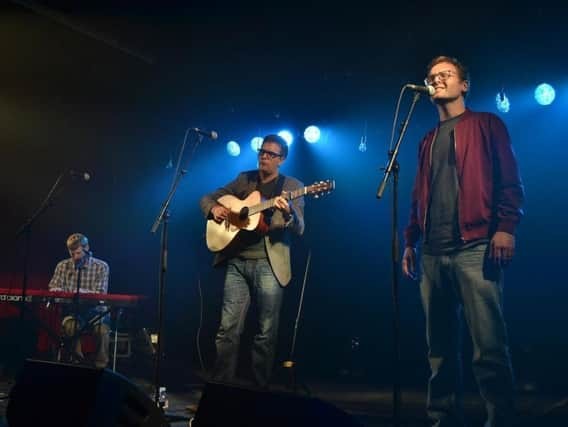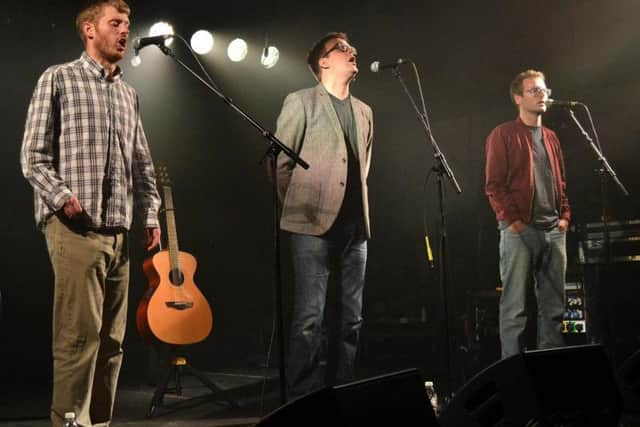Folk trio The Young 'Uns tell the story of an unsung local hero who fought the fascists and social injustice


The Young 'Uns, who come from Teesside, released their latest album, The Ballad of Johnny Longstaff, last month.
It tells the story of one man’s adventure, from begging on the streets in the North East to fighting against fascism in the Spanish Civil War, and taking in the Hunger Marches and the Battle of Cable Street.


Advertisement
Hide AdAdvertisement
Hide AdIt’s a timely, touching and often hilarious musical adventure following the footsteps of one working class hero who witnessed some of the momentous events of the 1930s.
With their trademark harmony, honesty and humour, the trio bring together 16 specially-composed songs, spoken word, striking imagery and the actual recorded voice of Johnny himself to tell a remarkable human story oozing with modern relevance.
Sean Cooney, Michael Hughes and David Eagle, who make up the trio, are taking the record on tour, including a date at Middlesbrough Town Hall on Friday, February 8.
The three-time BBC Radio 2 Folk Award winners describe the show as a piece of modern folk theatre, and vocalist Sean Cooney explained why they're so proud of it.


How did you meet?
Advertisement
Hide AdAdvertisement
Hide Ad"Michael and I have known each other virtually all our lives since we first met in primary school. We then met David [who grew up in Hartlepool] when we were 17."
How did The Young’uns come about?
"We were all into different types of music and then one night whilst out drinking in Stockton-on-Tees we somehow stumbled across our local folk club in The Sun Inn. We had no idea that in the back rooms of pubs all over the country ordinary people met to share songs, often about where they come from, often without instruments. It was a revelation. We had no idea such songs existed. There were songs about where we came from, songs about places we knew, songs that could be sung in a North East accent. We couldn’t believe it. We thought, ‘Why hasn’t anyone ever told us about these songs? Why didn’t we learn them in school?’ We kept going back to the club every Monday night and, because we were considerably younger than everyone else, we were given this really embarrassing name and now (almost 15 years later) we still haven’t managed to get rid of it! We never had any intention of starting a career in folk music at that stage. We just loved going to the club and joining in the choruses and soaking up the local songs."


What are The Young’uns known for?
"We’re known for our tight harmonies, but also having a laugh and bantering with each other on-stage. In more recent years we’ve gained a reputation for writing and performing songs with a social conscience. Our song Be The Man tells the tragic story of Naz Mahmood - who took his own life following his religious family’s reluctance to accept his sexuality - and his fiancée Matt’s mission to campaign for change. Through writing the song we’ve become good friends with Matt who recently asked us to become patrons of the Naz And Matt Foundation."
What are your most memorable achievements?


Advertisement
Hide AdAdvertisement
Hide Ad"We’ve been fortunate to win three BBC Radio 2 Folk Awards (Best Album 2018 for Strangers, Best Group in both 2015 and 2016), have played Glastonbury twice, and performed at hundreds of festivals, concert halls and venues in the UK, Europe, Canada and Australia. We constantly tell each other just how lucky and privileged we are to sing for a living. For me though it’s hearing people’s personal connections to the songs that is the most special. A number of people have told us just how important Be The Man has been in their lives. In one instance, a man who struggled to accept his son’s sexuality told us that the song has brought them closer together."
Who was Johnny Longstaff?
"Johnny Longstaff was an ordinary man who saw and did extraordinary things. He was born in our home town of Stockton-on-Tees in 1919. At the height of the Great Depression he begged for bread on the streets. When he was 15 he joined the National Hunger March and walked 240 miles to London, where he slept rough on the south bank of the Thames for several months. The inequality he witnessed in London changed the way he saw the world. He joined the Labour Party League of Youth and campaigned for a fairer future, and took part in mass trespasses which paved the way for the right to roam in Britain. Meeting Jewish refugees from Nazi Germany led him to oppose the rise of fascism in Britain, most significantly at Cable Street in the East End of London in 1936. Within a year he had lied about his age and went to fight against fascism in the Spanish Civil War. Wounded three times, he arrived back in Britain months before the outbreak of World War Two. He became a sergeant in the London Rifle Brigade and fought in Africa at El Alamein and in Italy at Monte Cassino. He was awarded a bronze star for gallantry. He campaigned for equality and justice for the rest of his life, and died in 2000."
How did the show come about?
"One night after a gig in Clevedon in Somerset in May 2015, Johnny’s son Duncan approached us with the story of his dad’s life. He encouraged us to listen to the recordings Johnny made for the Imperial War Museum in 1986. Duncan had hoped they would write a song about his dad - we actually ended up writing 16 songs! The songs were inspired by Johnny’s oral testimony, but also the access we were kindly given to his unpublished memoirs, his extensive photo archive, and library of Spanish Civil War literature (complete with his own handwritten ‘corrections’), and many anecdotal memories from the Longstaff family."
What should I expect if I go to see the show?
"The show is unlike anything we’ve ever done before. It’s a piece of folk theatre I suppose. Set against a backdrop of striking imagery, it’s a musical adventure through the tumultuous 1930s. Our 16 original songs weave in and out of Johnny’s own voice to tell his story. Johnny’s recorded voice is so warm, and the journey he takes us on is emotional; at times it’s harrowing, at times it’s hilarious. He was one ordinary man who saw and did many extraordinary things."
Has a recording been made of the show?
Advertisement
Hide AdAdvertisement
Hide AdThe album The Ballad of Johnny Longstaff was released in December 2018. It includes all songs from the show, along with selected pieces of Johnny’s oral testimony, and is accompanied by an extensive dossier of historical notes and lyrics along with poster, facsimile picture and extras. Fans can buy it at shows or online HERE.
"The Ballad of Johnny Longstaff is a show unlike any other we’ve ever been involved with," adds Cooney. "It took three years to write and has been a labour of love. We have immersed ourselves in one man’s world and emerged with an incredible story.
"Johnny Longstaff is not a well-known name in our hometown. There are no streets named after him, no one learns his name in school. But there were thousands of men and women just like Johnny who stood up to injustice and oppression in the 1930s, who gave so much and to whom we owe so much."